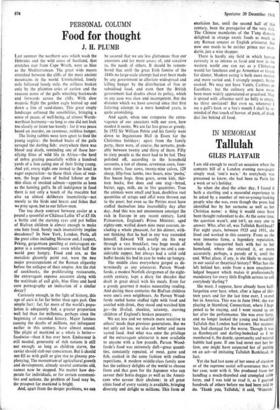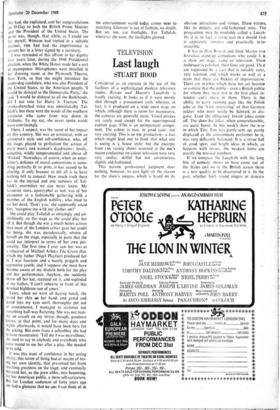Tallulah
IN MEMORIAM GILES PLAYFAIR
I am old enough to recall an occasion when the contents bill of a London evening newspaper simply read, 'SHE'S BACK.' As everybody was presumed to know,- she had been to Paris for a week or so's holiday.
So when she died the other day, I found it both a startling and a mournful experience to be asked by a number of not-so-young-looking people who she was, even though the press had identified her by her surname as well as her Christian name: a thing it would once have been thought redundant to do. At the same time, the question wasn't, and isn't, an easy one to answer. Who, after all, was Tallulah Bankhead? For eight years, between 1923 and 1931, she lived and worked in this country. From us she won immense fame, a legendary reputation, which she transported back with her to her homeland, where she retained it, or more accurately, perhaps, a parody of it, until the end. What place, if any, is she likely to occupy in our social or theatrical history? What has she left behind her, aside from a now unacknow- ledged bequest which makes it professionally mandatory for every little English actress to call everybody 'darling'?
She must, I suppose, have already been half- forgotten over here, when, after a lapse of thir- teen years and for the last time ever, I re-met her in America. This was in June 1944; she was playing in Stamford, Connecticut, where I hap- pened to be staying, and I went round to see her after the performance. She was over forty. and no longer looked the young and beautiful Tallulah that London had known. H,er manner, too, had changed for the worse. Though it was as flamboyant and darling-bedecked as I re- membered it, the da771e, spontaneity and natural bubble had gone. If one had never met her be- fore, one might have suspected her of putting on an act—of imitating Tallulah Bankhead, in fact.
Yet she had lost none of her sense of stardom or of the supreme social self-assurance that. in her case, went with it. She produced from her handbag a much-thumbed and crumpled cable form, and I was told to read it, as I guessed hundreds of others before me had been told to do. 'Thank you, Tallulah, it said, 'Winston.'
She had, she explained, sent her congratulations on D-Day to both the British Prime Minister and the President of the United States. The point was, though, that while, as I could see for myself, Winston had replied in a suitable manner, FDR had had the impertinence to answer her in a letter signed by a secretary.
I was reminded of this affront to her dignity four years later, during the 1948 Presidential
election, when the White House made her a sort
of recompense. Microphones were installed in her dressing room at the Plymouth Theatre,
New York, so that she might introduce the
under-dog candidate, who was also President of the United States, to the American people. 'I would be disloyal to the Democratic Party,' she said, 'I would be disloyal to all the Bankheads, did I not vote for Harry S. Truman.' The
smoke-drenched voice was unmistakably Tal- lulah's, but these were the words of the southern aristocrat who came from way down in Alabama. To my ear, she never spoke words more convincingly.
There, I suspect, was the secret of her impact on this country. She was an aristocrat, with an
aristocrat's style and self-confidence, who, off
the stage, played to perfection the actress of every man's and woman's daydreams: lovely,
seductive, wildly temperamental and above all 'Wicked.' Nowadays, of course, when an enter- tainer's defiance of moral conventions is some- thing perfectly fit to print, it has ceased to be alluring, if only because to tell all is to have nothing left to conceal. How much truth there was in the myriad and one rumours of Tal- lulah's enormities we can never know. My favourite story, apocryphal or not, was of her
encounter at a fashionable gathering with a member of .the English nobility, who tried to cut her dead. 'Don't you,' she supposedly asked him, 'recognise me with my clothes on?'
She could play Tallulah as enticingly and un- inhibitedly on the stage as she could play her
off it. But though she was a much better actress
than most of the. London critics gave her credit for being, she was, paradoxically, unsure of- herself on the stage, especially in parts that she could not interpret in terms of her own per- sonality. The first time I ever saw her was at
a rehearsal of Michael Arlen's The Green Hat, which my father (Nigel Playfair) produced her in. I was fourteen and a nastily priggish and aggressive youth; and I suppose she must have
become aware of my disdain both for the play and her performance. Anyhow, she suddenly
threw off her hat, stamped on it, and exploded at my father, 'I can't rehearse in front of this damned highbrow, son of yours.'
Later, when we were all having lunch, she rested her chin can her hand, and gazed and gazed into my eyes until, thoroughly put out of countenance, I managed to stammer out something half-way flattering. She was not mak- ing an assault on my virtue, though, goodness knows, at that point, and for many days and nights afterwards, it would have been hers for the asking. But even from a schoolboy she had to have reassurance. 'Tell me I was marvellous,' she used to say to anybody and everybody who came round to see her after a play. She needed to be told.
It was this want of confidence in her acting ability, this terror of being bad or maybe of los- ing her own identity, that prevented her from touching greatness on the stage, and eventually betrayed her, as she grew older, into becoming, for her American public, a mere self-caricature. But for London audiences of forty years ago she had a glamour that no one I can think of in
the entertainment world today comes near to matching. Glamour is out of fashion, no doubt. But so, too, are footlights. For Tallulah, wherever she went, the footlights glowed.



































 Previous page
Previous page